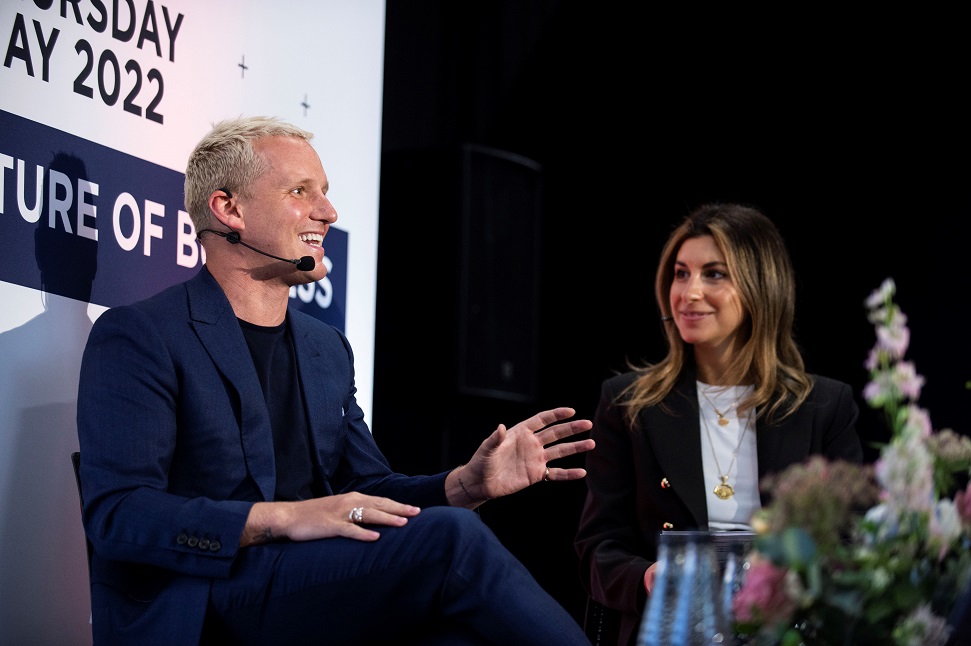“If you’ve seen Made in Chelsea, I apologise,” Jamie Laing begins, talking of his stint on the reality show that lasted for around nine years and nine months longer than planned.
He’s speaking at the SME XPO at London’s Olympia to an audience of small business owners. Now the reality TV star runs Candy Kittens, the fastest-growing confectionary company in Europe.
‘Jamie in Sweet World’ was created by Laing’s brother when they were children to help a fearful Jamie fall asleep at night. He’s been fascinated by sweets ever since<./p>
In his later years, Laing did theatre and performance at Leeds University. Once he left university, he had the choice of working for a wealth management firm or becoming a star of Made in Chelsea. At the time he thought it might be a shrewd opportunity to promote his sweet company idea.
He shares seven tips from what he’s learned while running the business.
Embrace naivety
Laing credits his success to a lack of knowledge and experience, giving him fresh ideas and allowing him to bring a unique product to the market. “When you’re flying a plane or driving a car, you follow logic. When you’re setting up a business, you go against the grain,” he says. “I think we underestimate naivety. It’s a superpower.”
When he first got the idea, he had a conversation with a friend which went a little something like:
“I’m going to be an entrepreneur.”
“What’s that?”
“I don’t know!”
He wanted to create something like a candy bar he’d seen in the US, but he always knew it was going to be called Candy Kittens.
Laing was staunch in following his vision: “I never listened to anyone, which was probably an advantage. Follow your own gut.” He does advise that you follow mentors when it comes to things like money though.
You need self-awareness
A degree of naivety helps but knowing yourself is a must. “You need self-awareness that you’re not the best at everything,” Laing says.
Confidence is all about exposure
Laing believes that confidence is about exposure. He links it to his obsessive compulsive disorder (OCD) “I have OCD – you don’t want to walk over three drains or you think the world is going to end, right?”
Woody Allen’s famous mantra “80 per cent of success is showing up” shapes his view of success. His boundless enthusiasm also helps maintain his passion for the business. “What drives success, I believe, is consistency,” he says. “I became persistent with Made in Chelsea.”
He uses the example of going on stage, pointing out that somebody who is nervous would find it terrible at first, but it would become easier after doing it a few times. “You should walk over those three drains to realise that nothing bad will happen.”
We collectively need more confidence in business too, as Laing explains: “In the UK, we lower our bar of what we can do. In the US a typical raise is $5-$6m whereas in the UK it’s more like $1.5m.”
Go to conventions and conferences
“I went to a talk and was recommended to read all of the books. I don’t read!” Laing prefers a much more people-focused, hands-on approach. “Go to every single convention you can find. Don’t give up! Businesses fail because they lose passion,” he says.
Be careful about who you hire
“An entrepreneur likes to control things. Let go of that!” Laing enthuses. Instead, he recommends having people around you that can do the things you can’t do. Having people who can bring a fresh outside take can be helpful too. “If you’re making fridges, you’ll probably hire someone who has already made fridges – they’ll go for the same form which they’ve used to make fridges. Hire someone who’s made trainers.”
He and his business partner Ed Williams made a lot of silly hires in the beginning. “We were hiring friends who we had to let go. Don’t take favours from friends – it will end in disaster,” he advises. As many other business owners have said, Laing tell the audience to hire someone who is the opposite to you – someone who has everything you don’t have and is everything that you’re not.
Another word of warning: don’t ask family. “It was a nightmare,” Laing says. He talks about his stepfather being chairman of Candy Kittens. He told Laing and Williams that he was going to make them fold the business if they didn’t sort a certain problem out.
The hardest part for Laing was hiring a PA. “Find someone to organise your life. [Otherwise], it’s like trying to play a PlayStation game with four controllers.”
In creative roles, there is probably someone who can do the job better than you. “Become the chef and let the sous chefs do the work,” he advises.
If he had to hire anyone, Laing wouldn’t be likely to hire himself. “I truly believe I’m unemployable,” he laughs. “I’m all over the place.”
Leave exporting until later
“If I’m honest, exporting is not a great idea,” Laing explains. “Remember that the UK market is huge. If you export too early, there are going to be ingredient issues, expensive shipping. It’s complicated. I’d tend to say focus on the UK. Once you’ve captured this market, then spread out.”
Focus on areas that are archaic
If you’re still deciding what kind of start-up you’d like to build, look at categories that are archaic and in need of development, such as cereal or sun cream.





